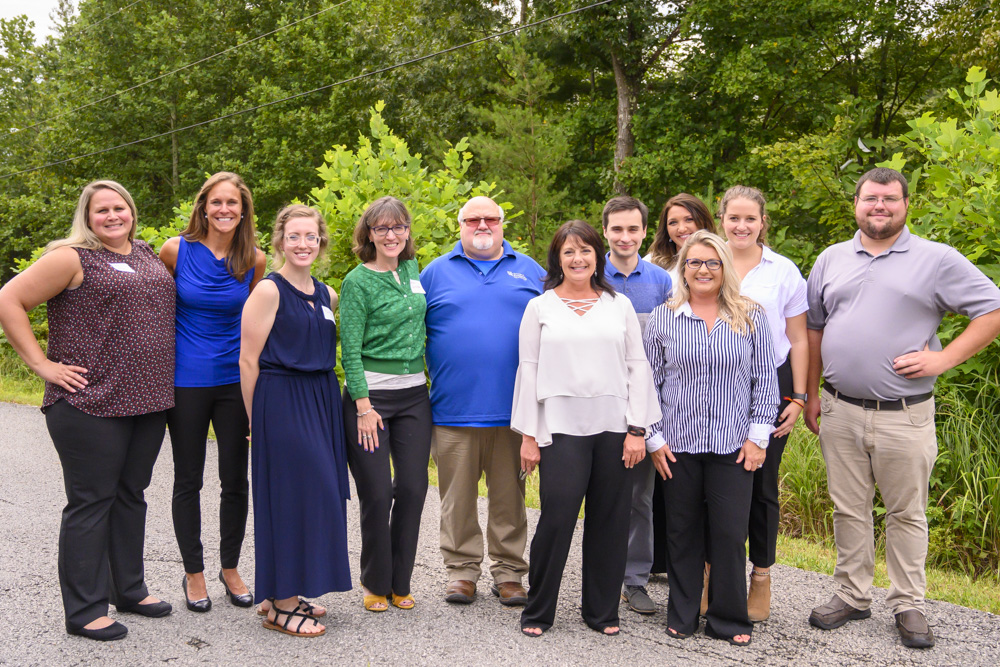Peer-based Retention Of people who Use Drugs in Rural Research
The Peer-based Retention Of people who Use Drugs in Rural Research (PROUD-R2) study addresses the epidemics of opioid prescribing, injection drug use, overdose and infectious disease transmission in rural America. Investigators in Ohio, Oregon and Kentucky had been working on local projects funded by the National Institute on Drug Abuse’s National Rural Opioid Initiative. Over time, they recognized commonalities in their states’ rural experiences with the opioid epidemic and the challenges of recruiting and retaining people in rural areas for research participation. The team sought to leverage the tightknit relationships and social connectivity of rural communities as an untapped resource for increasing access to drug use treatment interventions in rural America.
Challenges in recruitment and retention are common in substance use research, particularly in rural communities, and threaten the validity of clinical trials. The PROUD-R2 study tests strategies to improve the retention of people who use drugs (PWUD) in research in rural communities, and fosters participation of rural participants into clinical trials. Historically, research methods to study PWUD were crafted in urban settings and cannot simply be imported to rural communities, which differ demographically, socioculturally and in infrastructure. The study aims to identify optimal strategies for retaining people with opioid use disorder in clinical research in rural America. This study leverages the National Rural Opioid Initiative infrastructure in rural Oregon and Appalachian Kentucky and Ohio, using existing study pathways to recruit PWUD in rural settings.
In rural settings, people who use drugs or who are in recovery can successfully reach and engage their peers in treatment, but their potential to improve participation and retention in clinical trials is largely unexplored. The PROUD-R2 study tests an innovative peer-retention approach that combines elements of peer navigator models for outreach with the structure of peer recruitment (i.e., respondent-driven sampling) to improve study retention.
Study participants, who are recruited from the three states’ existing National Rural Opioid Initiative studies, are randomized to one of two arms: One group receives the standard strategy for study retention (i.e., outreach from the research staff by text message and phone call reminders); the other group watches a brief training video on how to encourage friends and people with whom they use drugs to stay engaged in the study (i.e., retention training) and receives incentives for helping to keep people in the study. Through qualitative interviews, discrete choice experiments, and follow-up surveys at six and 12 months following enrollment, PROUD-R2 explores perceptions of research participation and retention, assesses preferences and willingness to participate in future clinical trials, and examines the impact of the peer intervention on retention.
Each study site collaborates with local staff and local community advisory boards comprised of people with direct experience of the current opioid epidemic. The peer retention training video—where peers serve as actors—was developed by Comagine Health, a health care consulting firm, with input from the community advisory boards. PROUD-R2 also benefits from collaboration with Dr. Hannah Cooper of Emory University and Dr. Vivian Go at The University of North Carolina at Chapel Hill, who oversee qualitative data collection and analysis.
The first year of the project laid the groundwork for a successful three-state collaboration. Study teams in Oregon, Kentucky and Ohio harmonized their data collection instruments and locator forms, established a data coordinating center, and conducted a formative quantitative survey to sharpen the focus of the intervention. A national training is scheduled to bring the study teams together in person to standardize data collection procedures and study retention strategies.
PROUD-R2 recognizes the power of peers to connect with PWUD. Peers can build rapport and trust with people who use drugs as they discuss the personal and societal benefits of participating in clinical trials.
A quote from one of the study’s participants sums up the potential impact of peers and overarching goal of our project:
“…if I went to treatment I would much rather talk to someone that's been there, done that, than to talk to someone that's never experienced what I've experienced. You know, someone that knows where I'm coming from. Instead of someone trying to teach me about what I've already been through and has no idea.”
In the coming years, PROUD-R2 will continue to discover how to improve retention of difficult-to-reach populations in rural areas of the country most impacted by opioid use disorder.



